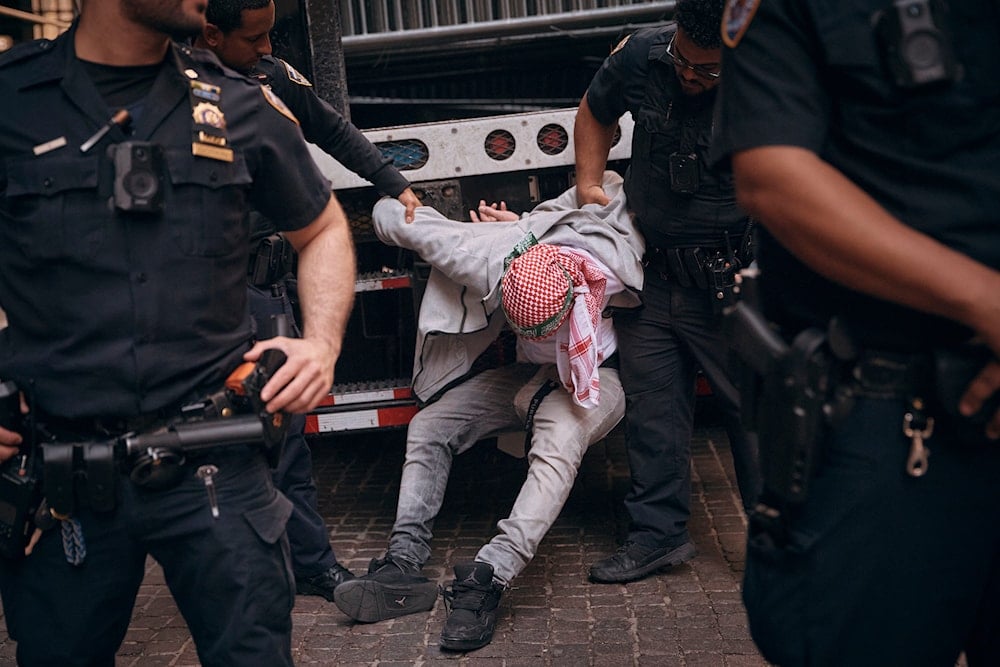Civicus adds US to watchlist over declining civic freedoms
Civicus has placed the US on its global watchlist for urgent concern, citing militarized protest responses, press restrictions, and a crackdown on Palestine solidarity activism under the Trump administration.
-

Police arrest a protestor during a pro-Palestine demonstration calling for an economic blockade and demanding a cease-fire on the Israeli war on Gaza outside The New York Stock Exchange on April 15, 2024, in New York. (AP Photo/Andres Kudacki)
The US has been placed on a global watchlist for concerns over the state of its civil society, according to a new report by the non-profit organization Civicus. The report places the US alongside Turkey, Serbia, El Salvador, Indonesia, and Kenya.
Released on Wednesday, the Civicus report cites "sustained attacks on civic freedoms" as the basis for the US’ inclusion. These include militarized responses to protests, increasing restrictions on media and civil society groups, and targeted actions against advocates supporting Palestine.
The report highlights three main issues driving the downgraded status of civic space in the US: the deployment of military forces against protesters, limitations imposed on journalists and civil society, and the criminalization of anti-war and Palestine solidarity activism.
Civicus assigns countries a rating based on the state of civic space, ranging from "open" to "closed." The US was downgraded to "narrowed," indicating that while basic rights to association, assembly, and expression are technically allowed, they are often violated in practice.
"People can form associations to pursue a wide range of interests, but full enjoyment of this right is impeded by occasional harassment, arrest, or assault of people deemed critical of those in power," the group explains. Protests may be peaceful, but excessive force, including tear gas and rubber bullets, is sometimes used, and permits can be denied under the pretext of security.
On media freedom, Civicus noted that while a range of views still circulates, "the state undermines complete press freedom either through strict regulation or by exerting political pressure on media owners."
Trump administration criticized for authoritarian measures
Civicus’s secretary general, Mandeep Tiwana, said the US "appears to be sliding deeper into the quicksands of authoritarianism." He pointed to the deployment of Marines and National Guard troops in California in June in response to protests against immigration raids, calling it a "dangerous precedent."
In a statement to The Guardian, Tiwana warned, "This level of militarisation sets a dangerous precedent. It’s a line that democratically elected leaders aren’t meant to cross." He also criticized efforts by the Trump administration to undermine public media, including proposed funding cuts to outlets such as PBS and NPR.
"What they’re trying to do is actually defund critical news sources and deny American people the ability to receive truthful, non-partisan reporting by pulling their funding," he added.
The report further condemns what it describes as a growing criminalization of peaceful advocacy, specifically actions expressing solidarity with Palestinian rights. Civicus cited the administration’s targeting of foreign-born student activists, Mahmoud Khalil, Mohsen Mahdawi, and Rümeysa Öztürk, as well as the sanctioning of Francesca Albanese, the UN special rapporteur for the West Bank and Gaza.
"We are seeing a wide-ranging attack on civic space in the US by the federal and some state governments," Tiwana stated.
He called on US authorities to "reverse course from the present undemocratic path by guaranteeing everyone’s First Amendment right to organise and dissent legitimately."
Columbia caves in to pressure; 80 expelled over Gaza solidarity
Last week, Columbia University expelled nearly 80 students for their roles in pro-Palestine protests earlier this year, including a high-profile library sit-in during final exams and an encampment staged over alumni weekend.
The sweeping disciplinary action, announced on July 23, marks one of the most aggressive responses by an American university to campus demonstrations related to the ongoing Israeli genocide in Gaza.
According to Columbia University Apartheid Divest (CUAD), the coalition behind the protests, expelled students have been banned from the university for periods ranging from one to three years. Some recent graduates also had their degrees revoked. Columbia confirmed the expulsions and said additional students faced disciplinary actions, such as probation and suspensions.
The crackdown centers on the takeover of Butler Library in May, which university officials alleged disrupted campus operations and violated multiple conduct codes. These are the first major rulings issued by the newly restructured University Judicial Board (UJB), which was moved under the provost’s office in March. Previously housed under the University Senate, the UJB was criticized by the Trump administration for being too permissive toward protest-related offenses.

 4 Min Read
4 Min Read










